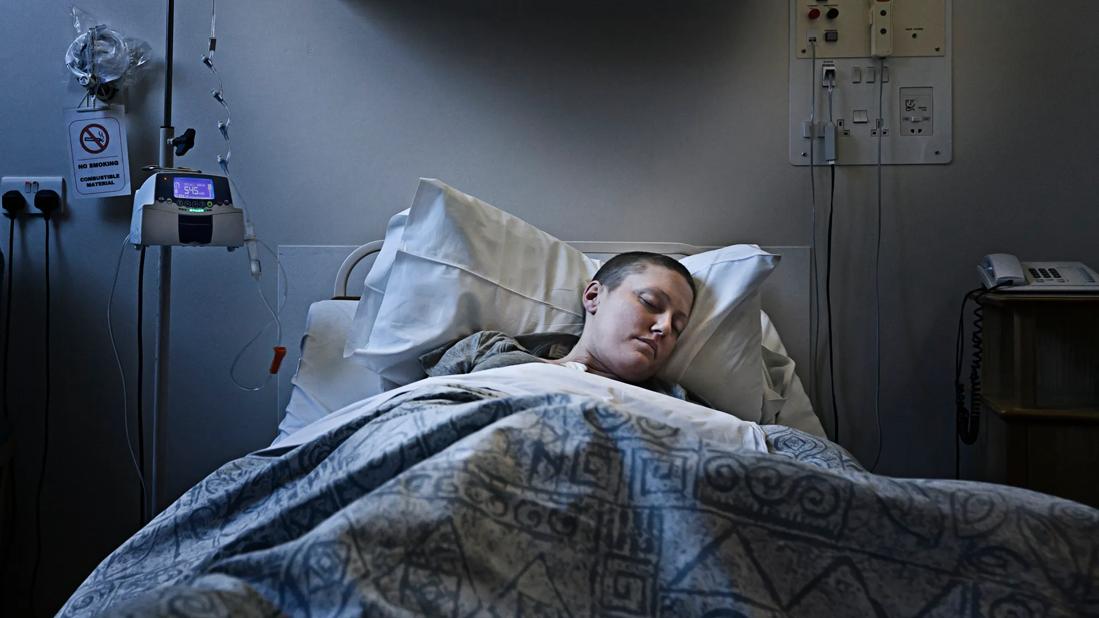Researchers create scale to quantify sleep attitudes

Sleep is an essential component for healing, yet hospitalized patients often report low quality and quantity of sleep. Nurses at Cleveland Clinic conducted research to ascertain nurses’ attitudes toward supporting sleep.
Advertisement
Cleveland Clinic is a non-profit academic medical center. Advertising on our site helps support our mission. We do not endorse non-Cleveland Clinic products or services. Policy
“The overarching objective was to identify the current attitudes of nurses across the U.S. toward promoting sleep for hospitalized adults,” says David Bendell, MSN, RN, NE-BC, AKC, formerly a clinical nurse at Cleveland Clinic. “We wanted to condense knowledge and attitudes into outcomes that would be useful for hospitals to implement in their own facilities.”
The research had a secondary aim. “We sought to develop a survey instrument that would not only answer questions about nurses’ attitudes, but could also be used in other research or quality improvement projects trying to improve the quality of sleep that patients get,” says Christian Burchill, PhD, MSN, RN, CEN, Nurse Scientist II in Cleveland Clinic’s Office of Nursing Research and Innovation. “Could nurses use this instrument to help figure out the attitudinal problem that was preventing sleep promotion from happening?”
Bendell’s interest in the subject was sparked while serving as a clinical nurse on a nephrology, ENT and plastics unit at Cleveland Clinic’s main campus. “One day, the nurse manager reported that we had suboptimal results for ‘quiet at night’ on the HCAHPS survey [Hospital Consumer Assessment of Healthcare Providers and Systems],” he says. “She asked unit members to think of ways we could improve quiet at night actions and scores.”
Bendell applied for and was awarded a Nursing Research Fund-Lit (NURF-Literature Review) Award to assess the strength and quality of evidence surrounding his practice issue and discover how nurses around the world achieved quiet at night goals. He partnered with Burchill, who served as a mentor. “Through the lit review, we discovered a considerable lack of nursing research and knowledge, not only around quiet at night, but also around the broader issue of promoting sleep at night,” says Bendell. “That led us to extend beyond the review and develop our own research.”
Advertisement
Before launching the study, Bendell had informal discussions with nurses at Cleveland Clinic to ascertain their attitudes and current practices related to sleep promotion. Simultaneously, Burchill reviewed social media venues to assess what nurses were saying about the topic. Overall, nurses felt they had adequate knowledge about the importance of sleep but felt helpless in promoting sleep due to unit and organizational culture and lack of leadership surrounding sleep promotion.
Bendell and Burchill utilized their findings to develop items for a new sleep attitude assessment scale. After querying more than a dozen experts globally as part of content validity testing, the nurse researchers added eight items, totaling 16 valid items for testing.
Bendell and Burchill conducted a cross-sectional study of nurses in inpatient settings from around the country to test the validity and reliability of their Sleep Attitudes Scale. The scale response options used a visual analog scale from “strongly disagree” to “strongly agree.” The scale was sent to 26 U.S. hospitals to distribute to nurses via email. Researchers received 1,756 completed surveys and pulled a random sample of 300 for analysis, yielding 294 surveys for final analysis.
In analysis and reliability testing, the original 16 scale items were reduced to a three-item single factor solution. The three items all related to unit and hospital culture. “Despite what we initially thought, the only thing that really mattered was the culture of promoting sleep,” says Burchill.
Advertisement
Researchers also discovered that the Sleep Attitudes Scale was not a useful tool for empowering nurses to promote sleep. Instead, once the unit/hospital culture related to patient sleep is identified, hospital leaders charged with improving the quality and quantity of patients’ sleep need to address unit and hospital culture.
Advertisement
Advertisement

Planning continues with critical, patient-focused input from nursing teams

Strengthening care through targeted resources and frontline voices

Embracing generational differences to create strong nursing teams

CRNA careers offer challenge and reward

An unexpected health scare provides a potent reminder of what patients need most from their caregivers

Cleveland Clinic Abu Dhabi initiative reduces ICU admissions and strengthens caregiver collaboration

Veteran nurse blends compassion, cutting-edge transplant training and military tradition to elevate patient care

Embrace coaching and other tips to be a stronger leader